|
|
|
Sort Order |
|
|
|
Items / Page
|
|
|
|
|
|
|
| Srl | Item |
| 1 |
ID:
104077


|
|
|
|
|
| Publication |
2011.
|
| Summary/Abstract |
The Israeli reservists played a major role in the protest movements that developed after the 1973 War and the First Lebanon War (1982-85). In other cases, debates about moral and political issues within the Israeli political system included petitions and rallies conducted by groups of reservists. How can scholars explain the special standing of the Israeli reservists within Israeli society? Why, during the 1970s and the 1980s, did the protests of the reservists lead to significant changes in the Israeli political and social arena, while this was not the case in the aftermath of the Second Lebanon War? The article explores these dilemmas by presenting different facets of the Israeli reserve army and its role in civil-military relations in Israel. The rationale for the establishment of the reserve army in Israel is discussed and is followed by an analysis of the changes the reserve forces have gone through since the establishment of the state.
|
|
|
|
|
|
|
|
|
|
|
|
|
|
|
|
| 2 |
ID:
104080
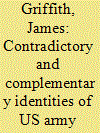

|
|
|
|
|
| Publication |
2011.
|
| Summary/Abstract |
Over the past three decades, evolving threats to U.S. national security have necessitated changes in the missions, structure, and organization of reserve forces. These changes, while intended to redefine the purposes and functions of the U.S. reserve force, at times had unanticipated effects on the individual reservist's experience of and identity with reserve military service. Emergent identities include the obliged-conscripted citizen soldier, weekend warrior, instrumental volunteer, identity seeker, soldier warrior, and conservative ideologue. The author elaborates on these identities and their association with geopolitical events and corresponding responses in the U.S. national defense strategy and concludes by discussing the implications of more recent identities for adequately staffing and readying the U.S. reserve force.
|
|
|
|
|
|
|
|
|
|
|
|
|
|
|
|
| 3 |
ID:
104087
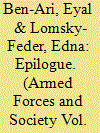

|
|
|
|
|
| Publication |
2011.
|
| Summary/Abstract |
This concluding epilogue places the individual studies presented in the special volume in wider perspective. The importance of studying reserve forces centers on (1) their centrality in missions carried out by the militaries of the contemporary industrial democracies and (2) their unique cultural and organizational characteristics. Concretely, reserve components are a foundation for the legitimacy of the military, yet are often a source for criticism of missions; they provide a ready pool of manpower but one that is sometimes expensive; their skills are sometimes needed but their military abilities do not always meet the perceived standards of standing forces' professionals. Research into this military group that is situated between the military and civil society clarifies not only the interlinkages between these spheres but also their dynamic and contextual nature.
|
|
|
|
|
|
|
|
|
|
|
|
|
|
|
|
| 4 |
ID:
104084
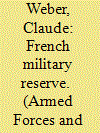

|
|
|
|
|
| Publication |
2011.
|
| Summary/Abstract |
This article reports on the current status of the system of the French military reserve. By reviewing a brief history of France's military, the author shows the existing ambivalence regarding the establishment of a permanent part-time force. In France, conscription was suspended in 1996, and a smaller professional military was created. This smaller force required a review of the needs and role of the French reserve force. Today, in France there are two reserve types: the operational and the ''citizen'' reserves. Each is examined in terms of its activities and the role, profiles, and motivations of its members. This analysis sheds light on the initial question of whether the French reserve is a real or an abstract force. The French military reserve plays not just a symbolic but also a purposive role, although essentially limited to the national territory.
|
|
|
|
|
|
|
|
|
|
|
|
|
|
|
|
| 5 |
ID:
104075
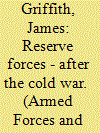

|
|
|
|
|
| Publication |
2011.
|
| Summary/Abstract |
The topic of reserve military service began with the citizen-soldier who performs military duties periodically, fending off community threats. Now, the reservist routinely performs full-time military service in support of national security operations. Evident in this shift are matters of importance, such as the preparedness of the reserve force, staffing the reserve force in its new role, the demographic and social representative-ness of the force, and so forth. Authors from different countries examine these and other issues concerning their reserve forces. Common content and themes in the articles are briefly described.
|
|
|
|
|
|
|
|
|
|
|
|
|
|
|
|
| 6 |
ID:
104082
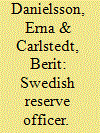

|
|
|
|
|
| Publication |
2011.
|
| Summary/Abstract |
The aim of this study is to examine the reserve force's role in and contribution to the new Swedish expeditionary armed forces. Survey data were obtained from 418 reservists. The results show that reserve officers are well educated and hold high positions in the civil society. According to the reserve officers themselves, the Armed Forces do not ask for their nonmilitary competence. The discontent with this situation is greater among the younger reservists as opposed to the older ones. Four different opinions on the need for the reserve officers are suggested. First, reserve officers are requested to fill vacancies, that is, a volume regulator. Second, the reserve officers are needed because they have unique competences other than military that are used by the armed forces. Third, reserve officers are needed from an economic point of view. Finally, reserve officers contribute to the civil-military relationship. However, when using a framework intended for regular officers, the contribution of the reserve officers' civil professional competence has not been recognized.
|
|
|
|
|
|
|
|
|
|
|
|
|
|
|
|
| 7 |
ID:
104079


|
|
|
|
|
| Publication |
2011.
|
| Summary/Abstract |
This article describes the structure of the Swiss militia armed forces and its preconditions. It explores in what ways the Swiss militia, which is founded on the principle of citizens in uniform, was affected by the changes in values that took place in Western societies from the 1960s and 1970s onwards as well as by the new security-political situation arising in the aftermath of the cold war. There is strong evidence that the concept of the citizen in uniform has clearly lost relevance. Voluntary commitment to society and a sense of duty as a citizen are no longer the main reasons for the involvement in the military. Instead, it is a question of individual cost-benefit analysis. Thus, the concept of the citizen in uniform may not only change for the individual soldier, but it may also be perceived differently by society.
|
|
|
|
|
|
|
|
|
|
|
|
|
|
|
|
| 8 |
ID:
104085
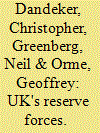

|
|
|
|
|
| Publication |
2011.
|
| Summary/Abstract |
This article focuses on how the role and structure of the UK's Reserve Forces have changed since their foundation before the First World War, with particular attention paid to the last two decades, during which time government has sought to make the Reserves more useable and relevant to post-Cold War military missions, including changing the legislative and administrative basis of their use. Since 9/11, Reserves have played an important role in the defense of the United Kingdom, particularly in operations in Afghanistan and Iraq, but the recent financial crisis has spurred further consideration of how best to structure and use this capability, which has been included as part of the recent Strategic Defence and Security Review (SDSR). The article analyses the current debate on whether the number of Reserve Forces should be cut or increased, and on how best to integrate their efforts with those of the Regular Forces. It also considers the evidence on the recent operational experience of Reserve Forces and its impact on a number of personnel issues, including recruitment, retention, and their health and well-being. The differences between the health and well-being outcomes for Reserve and Regular Forces are discussed and future lines of research enquiry highlighted, while the implications for the comparative analysis of Reserve Forces are also drawn out.
|
|
|
|
|
|
|
|
|
|
|
|
|
|
|
|
| 9 |
ID:
104083
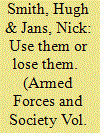

|
|
|
|
|
| Publication |
2011.
|
| Summary/Abstract |
This article reviews the history of military reserves in Australia with particular reference to the Army Reserve. It shows how the importance of reserves in Australia has waxed and waned across the past two centuries, from an early situation of primacy in the colonial period. The importance of reserves has reemerged in the post-Cold War era, with new forms of reserve organization evolving alongside ''conventional'' reserve forces. The authors discuss the extent to which these developments need to be accompanied by attention to cultural and personnel management issues and to enhanced reserves-regular integration. Despite the challenge of juggling civilian employment with reserve commitments, most reservists appear to welcome a greater, rather than a token, obligation to serve. There is a viable and meaningful role for the reserves provided that the Australian Defence Force and the government are prepared to devote sufficient effort to them and to assign them appropriate tasks.
|
|
|
|
|
|
|
|
|
|
|
|
|
|
|
|
|
|
|
|
|